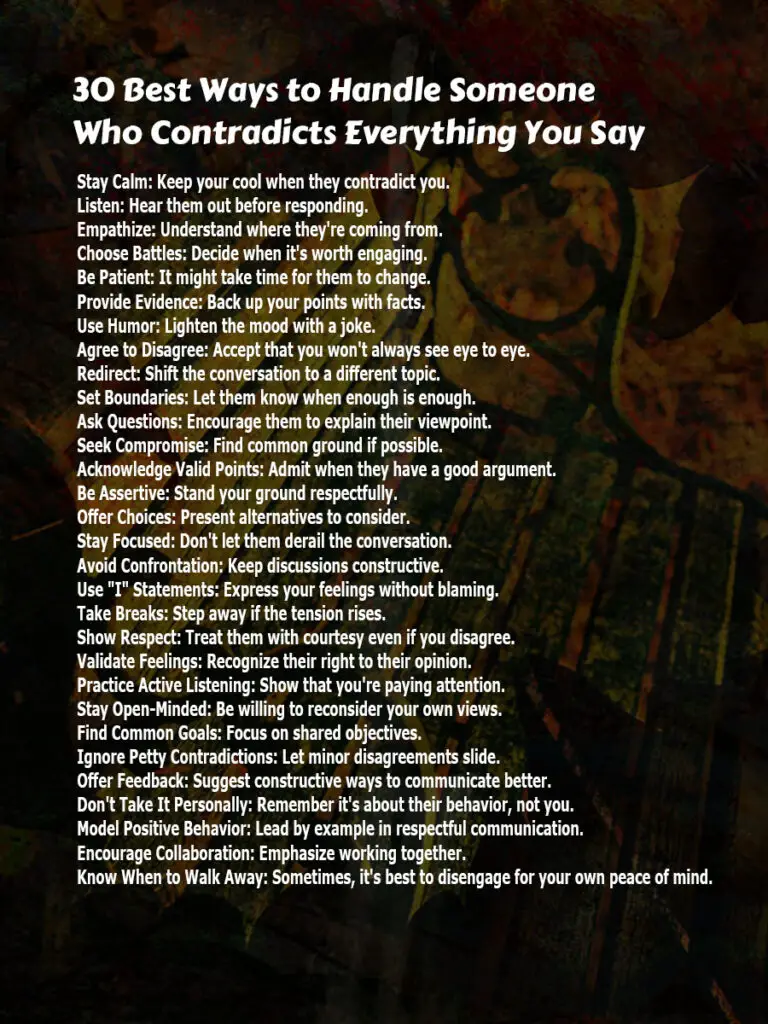Dealing with someone who always disagrees with you can be tough. It might feel like they don’t listen or respect your thoughts. But don’t worry, there are ways to handle this situation calmly and respectfully. In this blog post, we’ll explore simple tips to navigate conversations with people who contradict everything you say.
These tips are easy to understand and can help you keep your cool, communicate effectively, and maintain positive relationships, even when faced with constant contradiction. So, let’s dive in and discover how to handle these situations with grace and confidence!

Here are 30 Ways to Handle Someone Who Contradicts Everything You Say:
- Stay Calm: Keep your cool when they contradict you.
- Listen: Hear them out before responding.
- Empathize: Understand where they’re coming from.
- Choose Battles: Decide when it’s worth engaging.
- Be Patient: It might take time for them to change.
- Provide Evidence: Back up your points with facts.
- Use Humor: Lighten the mood with a joke.
- Agree to Disagree: Accept that you won’t always see eye to eye.
- Redirect: Shift the conversation to a different topic.
- Set Boundaries: Let them know when enough is enough.
- Ask Questions: Encourage them to explain their viewpoint.
- Seek Compromise: Find common ground if possible.
- Acknowledge Valid Points: Admit when they have a good argument.
- Be Assertive: Stand your ground respectfully.
- Offer Choices: Present alternatives to consider.
- Stay Focused: Don’t let them derail the conversation.
- Avoid Confrontation: Keep discussions constructive.
- Use “I” Statements: Express your feelings without blaming.
- Take Breaks: Step away if the tension rises.
- Show Respect: Treat them with courtesy even if you disagree.
- Validate Feelings: Recognize their right to their opinion.
- Practice Active Listening: Show that you’re paying attention.
- Stay Open-Minded: Be willing to reconsider your own views.
- Find Common Goals: Focus on shared objectives.
- Ignore Petty Contradictions: Let minor disagreements slide.
- Offer Feedback: Suggest constructive ways to communicate better.
- Don’t Take It Personally: Remember it’s about their behavior, not you.
- Model Positive Behavior: Lead by example in respectful communication.
- Encourage Collaboration: Emphasize working together.
- Know When to Walk Away: Sometimes, it’s best to disengage for your own peace of mind.
See Also: 36 Ways to Respond to “Many Happy Returns”
Understanding Contradictory Behavior
Dealing with individuals who constantly contradict everything you say can be challenging. Understanding the reasons behind this behavior and its effects on communication is essential in effectively managing such situations.
Causes Of Contradictory Behavior
- Low self-esteem can drive someone to contradict others frequently.
- Desire for control may lead individuals to oppose differing opinions.
- Fear of being wrong can manifest as constant contradiction.
Impact On Communication
- Creates tension and hampers a harmonious exchange of ideas.
- Breaks down trust and undermines effective communication.
- Limits meaningful dialogue and mutual understanding.
Effective Communication Strategies
Effective communication strategies are essential when dealing with individuals who constantly contradict everything you say. By implementing active listening techniques and clarifying misunderstandings, you can navigate these situations with poise and effectiveness.
Active Listening Techniques
When confronted with someone who continually contradicts your statements, employing active listening techniques can foster a more constructive dialogue. Maintain eye contact and nod periodically to demonstrate your attentiveness, and avoid interrupting the speaker. Paraphrase their points to show that you understand their perspective, which can help de-escalate the situation and promote mutual respect.
Clarifying Misunderstandings
In instances where contradictory responses stem from misunderstandings, it’s crucial to proactively address these discrepancies. Ask open-ended questions to gain clarity on the other person’s viewpoint and provide specific examples to illustrate your intended meaning. Remain patient and approach the exchange with empathy, emphasizing the importance of mutual understanding to facilitate effective communication.
Also Read: 30 Ways to Express Gratitude for Kind Words
Maintaining Emotional Balance
To maintain emotional balance when dealing with someone who constantly contradicts you, it’s important to stay calm and remain respectful. Listen actively, acknowledge their perspective, and try to find common ground to diffuse tension. Set boundaries if needed, and prioritize communication over confrontation for smoother interactions.
Managing Frustration
Frustration can easily arise when dealing with someone who constantly contradicts everything you say. It’s important to manage your frustration to prevent it from escalating and causing unnecessary tension in the relationship. One effective way to do this is by taking a step back and reminding yourself that their contrary behavior is not a reflection of your knowledge or expertise.
Try to remain calm and composed when faced with contradictory statements. Take a deep breath and remind yourself that everyone is entitled to their own opinion, even if it differs from yours. Keep in mind that engaging in a heated argument will likely only worsen the situation, so it’s best to approach the conversation with a level-headed mindset.
If you find yourself becoming overwhelmed with frustration, consider practicing relaxation techniques such as deep breathing, meditation, or even taking a short break to collect your thoughts. Remember, maintaining your emotional balance is key to effectively handling the situation and keeping the conversation constructive.
Practicing Empathy
When faced with someone who contradicts everything you say, it can be challenging to understand their perspective. However, practicing empathy is crucial in managing these interactions. Try to put yourself in their shoes and understand why they might feel the need to constantly contradict you. By doing so, you may uncover underlying reasons such as insecurity, a desire for attention, or a habit of playing devil’s advocate.
It’s important to approach the situation with a genuine desire to understand their viewpoint. Encourage them to express themselves fully without interruption, and actively listen to what they have to say. Even if you don’t agree with their perspective, showing empathy can help build rapport and foster a more open and constructive conversation.
Empathy also involves acknowledging your own emotions while recognizing theirs. Be aware of your triggers and reactions, and aim to respond with empathy rather than defensiveness. This can help create a more understanding and respectful dynamic, which may lead to a more productive and less contradictory discourse.
Setting Boundaries
Establishing clear boundaries is crucial when dealing with individuals who tend to contradict everything you say. Communicate assertively and calmly, reiterating your stance and reasons without engaging in prolonged debates. It’s essential to maintain your composure and not let their behavior affect you negatively.
Establishing Limits
When dealing with someone who contradicts everything you say, setting boundaries becomes crucial. Establishing limits helps you maintain your peace of mind and protect your self-esteem. Here are a few actionable steps to help you in this process:
1. Recognize your worth: Remember that your thoughts and opinions hold value. Acknowledge that the constant contradiction from the other person should not undermine your self-confidence.
2. Identify triggers: Pinpoint the topics or situations that typically lead to contradictory behavior. Being aware of these triggers helps you stay prepared and handle the situation more effectively.
3. Clearly communicate your boundaries: Express your discomfort and set clear limits with the person. Use “I” statements to convey how their behavior affects you. For example, say, “I feel undermined when you constantly contradict me. I would appreciate if you could respect my perspective.”
4. Stick to your stance: Stay firm in your beliefs and opinions. Don’t let the other person’s contradicting behavior sway or manipulate you into doubting yourself. Confidence in your thoughts helps establish consistent boundaries.
Reframing Responses
Responding to constant contradiction requires a strategic approach. By reframing your responses, you can navigate these situations with grace and confidence. Here are a few techniques to consider:
1. Acknowledge their viewpoint: Start your response by acknowledging the other person’s perspective without conceding your own. This demonstrates empathy and encourages a more productive conversation.
2. Redirect the focus: Shift the conversation away from contradicting each other by finding common ground or redirecting the discussion towards a different topic that aligns with both parties’ interests.
3. Ask for clarification: When faced with contradictory statements, ask the person to elaborate on their viewpoint. By seeking additional information, you gain a better understanding of their perspective and can respond more effectively.
4. Offer evidence or examples: Support your point of view with concrete evidence or real-life examples that strengthen your argument. This helps counteract baseless contradictions with logical reasoning and facts.
5. Respectfully disengage: If the other person continues to contradict you despite your efforts, it’s important to know when to disengage. Politely end the conversation or change the topic to avoid prolonging a futile argument.
Remember, setting boundaries and reframing your responses are effective strategies to handle individuals who consistently contradict everything you say. Applying these techniques empowers you to maintain your confidence, assert your opinions, and foster healthier communication.
See Also: 36 Best Ways to Respond to Just Got Off Work
Seeking Professional Help
For handling someone who constantly contradicts you, seeking professional help can be beneficial. A therapist or mediator can provide guidance on communication techniques and conflict resolution, fostering a more constructive and harmonious relationship. Additionally, external support can offer valuable insights and strategies for navigating challenging interactions.
Counseling Or Therapy Options
When dealing with someone who constantly contradicts you, seeking professional help through counseling or therapy options can be an effective approach. Counseling facilitates a safe space for you to express your frustrations and concerns, while a therapist can offer valuable guidance on how to manage the situation. Therapy can equip you with tools to navigate challenging interactions and improve communication.
Mediation And Conflict Resolution
Mediation and conflict resolution are valuable tools for handling someone who contradicts everything you say. Mediation involves a neutral third party facilitating a structured negotiation between you and the individual in question. This can help facilitate productive discussions and find common ground. Conflict resolution strategies can empower you to address the contradictions in a constructive and productive manner.

Conclusion
Dealing with someone who constantly contradicts you can be challenging. However, by staying calm and using effective communication techniques, you can handle the situation positively. Remember to set boundaries, consider the other person’s perspective, and focus on finding a resolution.
By being assertive yet empathetic, you can navigate conflicting conversations with grace.









